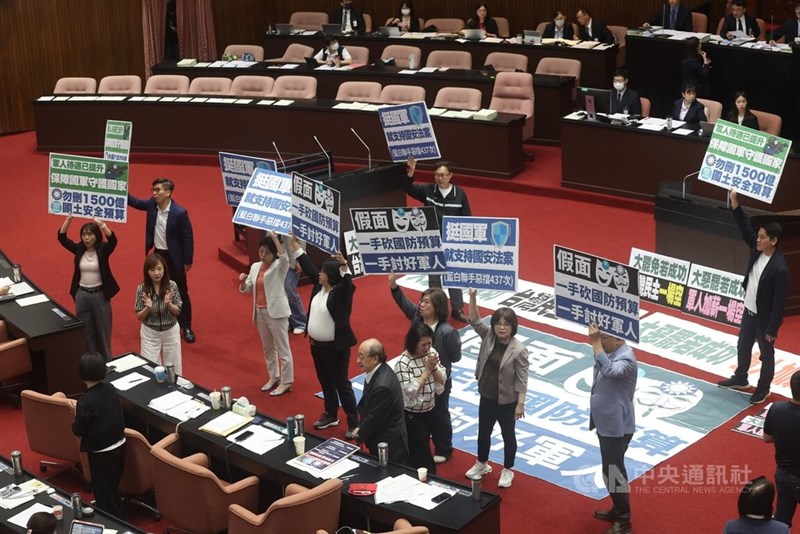KMT passes NT$30,000 allowance for volunteer troops, DPP alleges move tied to recalls

Taipei, June 10 (CNA) Kuomintang (KMT) lawmakers on Tuesday passed an amendment raising volunteer soldiers' monthly allowance to NT$30,000 (US$1,002), an increase of over NT$15,000, along with other benefits, a move the Democratic Progressive Party (DPP) said was aimed at helping KMT legislators facing possible recalls.
The monthly allowance will be granted to all volunteer military personnel, regardless of rank, effective Jan. 1, 2026, under the amendment to Article 5 of the Armed Forces Pay Act, which was passed in a second round of voting, with 52 votes in favor and 50 against. Eight Taiwan People's Party (TPP) lawmakers were absent.
Currently, volunteer military personnel for ranks of majors and below receives a monthly allowance of NT$15,000 in addition to their salary, while lieutenant colonels and colonels receive NT$14,000, and generals receive NT$13,000.
The amended article also introduced new types of designated allowances for volunteer military personnel, with specific amounts to be determined by the Executive Yuan, and required all allowances to be adjusted accordingly whenever the cumulative consumer price index (CPI) reaches 3 percent.
KMT Legislator Wang Hung-wei (王鴻薇) said that the amendment was intended to address Taiwan's shortage of recruits.
Wang cited Ministry of National Defense (MND) data stating that the total number of volunteer military personnel declined from over 164,000 in 2021 to more than 152,000 in 2024, leading to a significant shortfall in troop strength.
"This highlights problems within the national defense system," she added.
The KMT did not provide a budget estimate for the amendment.
According to Wu Szu-yao (吳思瑤), a caucus whip of the ruling DPP, the amended Article 5 would require an annual budget of NT$38.6 billion.
Wu accused the KMT of making another effort to prevent some of its members from being recalled.
This amendment -- along with the recently enacted legislation that grants everyone four additional national holidays and extends Labor Day to public-sector employees, and a proposal to distribute a NT$10,000 cash handout -- serves to curry favor with voters and ensure the KMT's political survival, she said.
As of Tuesday, 31 KMT lawmakers could face recall elections after civic groups -- dissatisfied with the party's actions in the Legislature, including massive government budget cuts -- launched recall campaigns and successfully gathered enough signatures through a two-stage process to initiate the cases.
Regarding the amendment, the smaller opposition TPP abstained from voting on the KMT's version, as it favored a tiered structure for monthly allowances in the volunteer force -- NT$25,000 for majors and below, NT$18,000 for mid-level officers, and NT$13,000 for generals
The TPP, however, voted in favor of the KMT's amendment to Article 6 of the law, which stipulates that the monthly salary of conscripted military personnel shall not be lower than the minimum basic wage.
At present, salaries for conscripted military personnel are proposed by the MND and approved by the Executive Yuan, with privates second class receiving the lowest monthly pay of NT$21,350 -- below the minimum wage of NT$28,590.
Later on Tuesday, Executive Yuan spokesperson Michelle Lee (李慧芝) issued a statement saying the amendments passed by the Legislature violated Article 70 of the Constitution, which says that the Legislative Yuan shall not propose increases to the expenditures in the budget submitted by the Executive Yuan.
They also violated Article 91 of the Budget Act and Article 5 of the Fiscal Discipline Act, which are designed to prevent the Legislature from unilaterally increasing government spending without legal and fiscal justification, Lee said.
The Executive Yuan will seek legal remedies to overturn the amendments, Lee said, without specifying what measures it planned to take.
Lee stated that the amendments would increase the government budget by NT$29 billion a year, which contradicted the figure provided by Wu.
- Cross-Strait
'Not afraid': DPP lawmaker slams China over 'secession' investigation
10/28/2025 08:25 PM - Society
NHI co-pay for nonreferral appointments likely to rise in 2026: Official
10/28/2025 08:18 PM - Society
Bank, NGO unveil AI-driven migrant worker counseling service
10/28/2025 07:22 PM - Politics
Control Yuan launches probe into alleged forced labor highlighted by NGO
10/28/2025 07:07 PM - Society
Taoyuan Airport 3rd runway completion pushed back to 2032
10/28/2025 06:49 PM